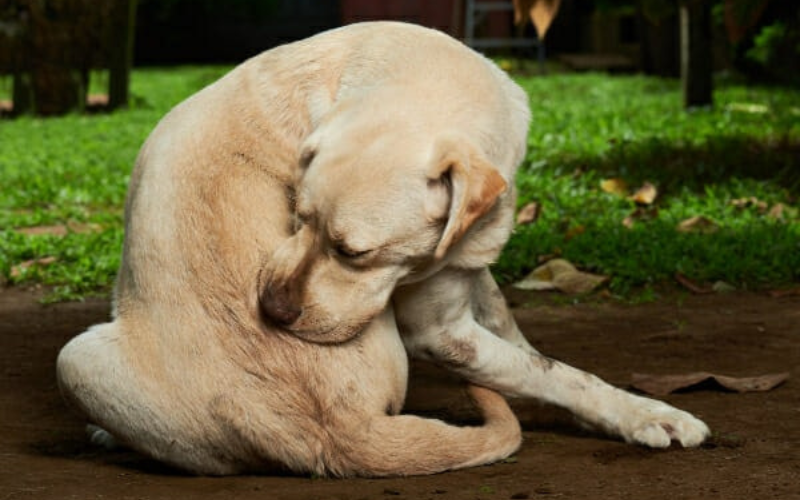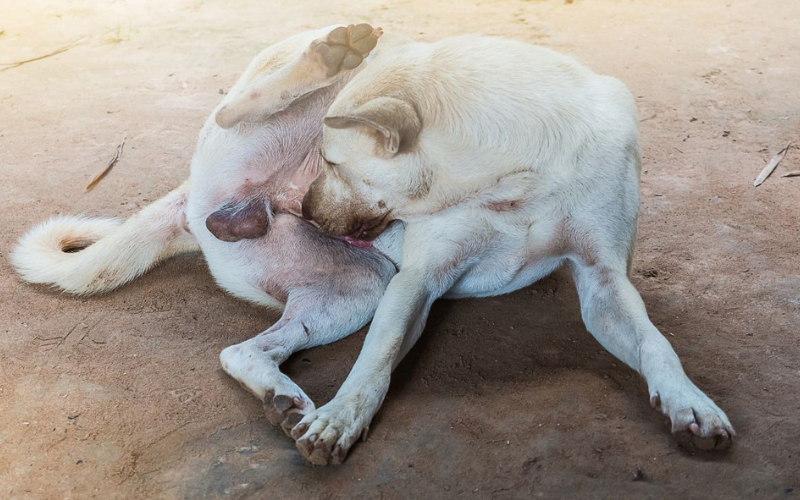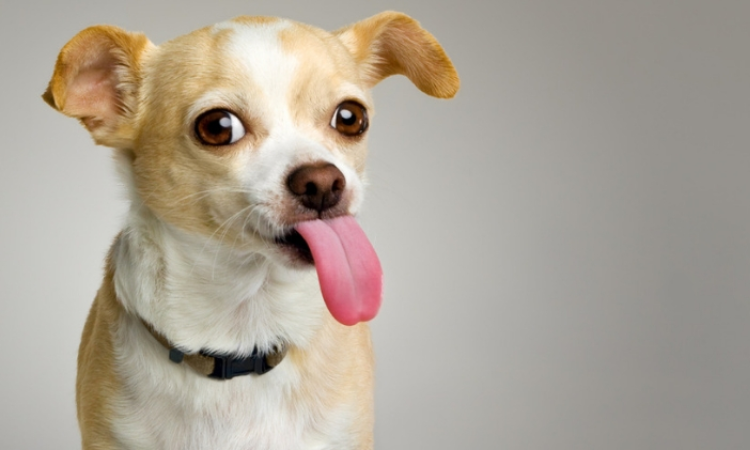Dogs are cute, but they sometimes do weird, gross things that their owners don’t always understand. In most cases, they behave normally. If your dog does things like chew grass or nips another dog’s butt, or circles before lying down, you can relax. This article will investigate the reasons why certain dogs lick their rear ends excessively, as well as possible solutions.
Why Do Dogs Lick Their Butts?
While you may find your dog’s butt-licking disgusting, know that he is likely just trying to clean himself. You read that right; butt licking serves a primary grooming function. He’s trying to maintain a clean private area in the same way that we do by showering regularly.
Because feces can become lodged in the fur around the butt, it may take your dog a little longer to finish its bath. It’s usually irrelevant and nothing to worry about. However, when a dog licks its privates excessively, it could be a sign of a serious illness.
5 Possible Reasons Why Your Dog Is Licking His Butt Excessively
What should you do if your dog is excessively licking its butt, given that grooming is the most prevalent explanation for this behavior? Common health problems that might arise from butt licking are described. Both dog owners and non-dog owners will find this section interesting.
1. Anal Gland Problems
Anal gland dysfunction is a common cause, so that’s where we start. Located just under the skin on either side of a dog’s anus, these glands are frequently referred to as anal sacs. When your dog defecates, the glands are empty, creating a foul stench. This scent is quite important in social situations.
Dogs form buddies and exchange messages by sniffing one other’s rear ends. The dog’s arrival is announced and its territory is marked with the fluid. This noxious fluid may cause problems with the anorectal glands. If the fluid is not eliminated through the dog’s feces, it might build up and lead to anal gland disease.
A dog’s poop also contains microorganisms that are normally expelled through feces. When the produced fluid thickens, a bulge forms in the canal and the glands may drain.
Causes of Anal Sac Disease
Brown-and-white spotted bull terrier looking out over the horizon. Unsanitary bowel habits may contribute to the development of this condition. This originates in intolerance to certain foods. The loose stools that your dog passes, when it has diarrhea, don’t put enough pressure on the glands to drain them properly.
Your dog’s abnormal gland positioning may also make it hard for him to drain the glands. Anatomical irregularities may cause your dog’s glands to be located too far from the anus. A dog’s inability to flex its rectus muscles may be similar to that of an overweight human. Another common reason is allergies that might affect the rectum.
2. Canine Separation Anxiety
Like humans, dogs might suffer from anxiety from time to time. If left untreated, it can progress to a state of anxiety manifested in disruptive behaviors. It’s possible for a dog to get separation anxiety if they’re suddenly cut off from their human companion. Previous studies have found that as many as 18.7% of shelter-adopted dogs experience anxiety.
Excessive grooming is a common sign of anxiety, just as excessive barking and destructive behavior. Unfortunately, many owners brush off such red flags as the result of their dog’s typical mischievous behavior. Ignoring the signs could cause the owner and pet to lose their attachment, which could lead to the adoption of a new home.
Causes of Separation Anxiety
Dogs who have been abandoned and then adopted are the most common sufferers of separation anxiety. Your dog may develop separation anxiety if you don’t give it the care it needs. However, it’s possible that focusing too intently would cause problems. Your dog may experience severe anxiety if it is being left alone for the first time for an extended period of time.
3. Parasites
Parasites are an essential part of this article’s description of why dogs lick their buttocks. Parasites of the intestinal and extraintestinal variety should be avoided. Internal parasites can be seen in the dog’s feces, whereas external parasites are most commonly found near the dog’s tail. To alleviate the pain and discomfort, a dog may lick its butt excessively.

4. Allergies
Your dog may be licking its butt due to food or environmental sensitivities. Licking and scratching may seem innocuous, but they can really lead to yeast and bacterial infections that require medical attention.
Food Allergies
Dog snoozed close to its bowl of kibble. There could be an allergen in the dog’s food. Ingredients in dog food are the most common source of immune system reactions in canines.
How Do Food Allergies Form?
Any food can trigger an allergic reaction; proteins are just the most common culprit. Food intolerance is common, and damage to the digestive tract is a common reason. In addition, some dog breeds, like cocker spaniels, are more likely to develop food allergies than others.
Environmental Allergies
Do you find that your dog licks its rear end more often during certain times of the year? Environmental allergens can cause symptoms in dogs, just as they can in humans. It’s important to rule out seasonal allergies if your dog’s symptoms get worse in the spring and summer. There is a subtle distinction in how people and their pets react. Some of the symptoms include excessive licking of the skin, loss of fur, an uneven coat, and sneezing and watery eyes.
5. Skin Infections
The anus of a dog is an extremely fragile area. If the tear comes into contact with dog poop, it may become infected with bacteria or fungi. In an effort to alleviate the pain, your dog may lick its butt. This can make the infection worse, so it’s important to keep an eye out for any signs of skin sensitivity.
If your dog has a bacterial infection, it could have stomach problems like diarrhea and vomiting. Its anus could also be covered in crimson bumps. A fungal infection in your dog’s body can cause hair loss, dry skin, brittle nails, and a discolored red or black anus.
How to Stop Your Dog Licking Its Butt?
The solution to this problem hinges on determining why your dog licks his butt. The health of your dog can usually be improved with at-home care.
- Review Your Dog’s Diet
- Clip Your Dog’s Fur to Ventilate the Rectum Area
- Help Your Dog Get Used to Being Left on Its Own
- Bathe Your Dog and Comb Its Fur
- Find the Food That Causes Problems
- Clean Your Dog After Walks During Hay Fever Season
- Seek Medical Attention if Your Dog Experiences a Severe Allergic Reaction
- Boost Your Dog’s Immune System
Final Thoughts
Why, then, do canines engage in this peculiar behavior? A form of personal grooming. Even worse, the dog may be trying to remove anything from its fur, such as grass or faeces. While it’s normal for dogs to lick their rear ends, compulsive butt licking could indicate a more serious problem.
Anal gland diseases, allergies, parasites, skin infections, and anxiety are just some of the medical issues that have been associated to compulsive butt licking. We hope this article has shed some light on any problems you’ve been having with your dog. Finding the source of the problem is essential in order to cure your dog before the condition worsens. If you notice something is wrong with your dog, act immediately.





